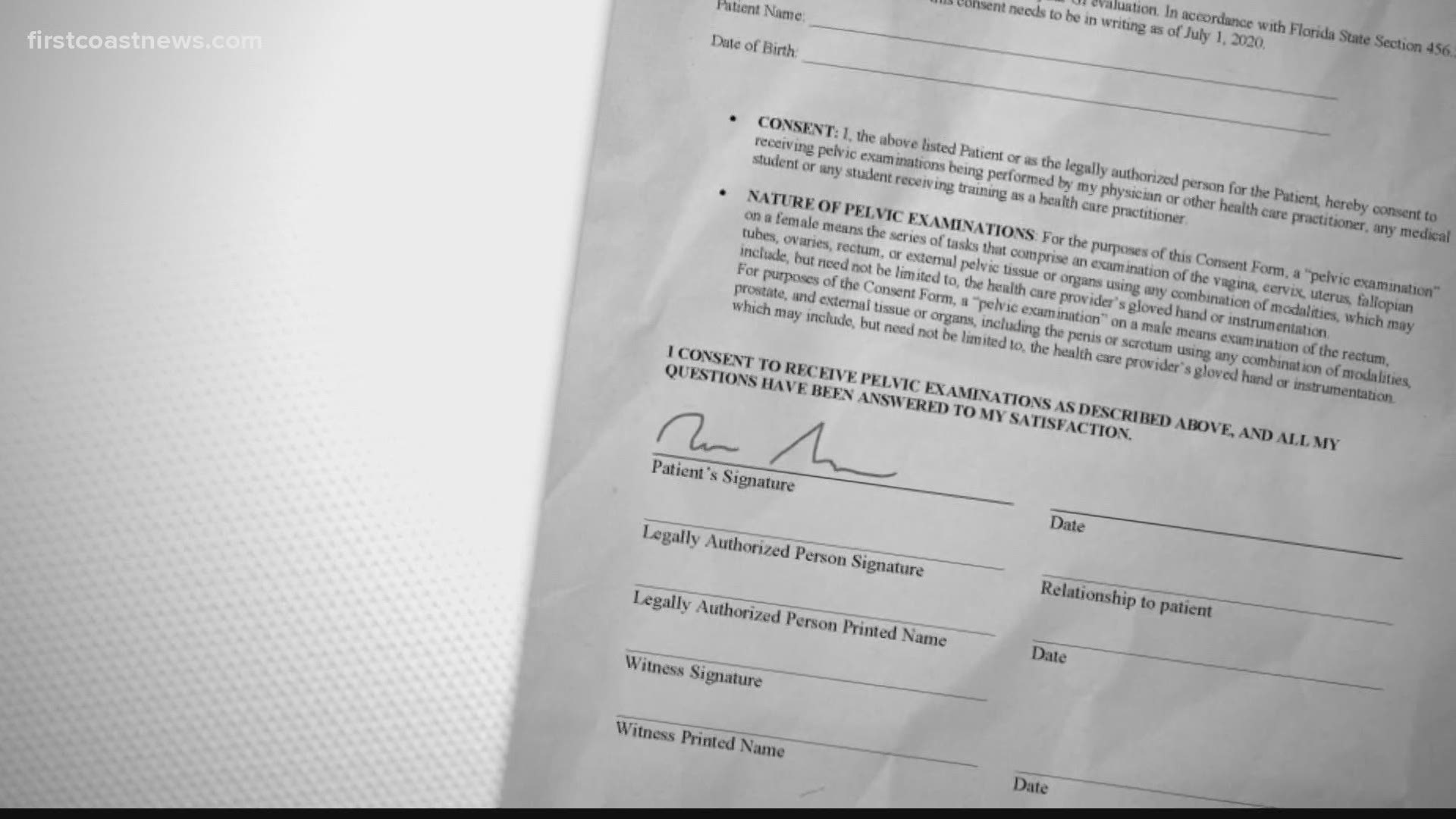JACKSONVILLE, Fla. — It’s a procedure so routine, even the name is predicable: the annual exam.
For women of any age, this yearly doctor visit entails two certainties: a breast exam and a pelvic exam. Nothing to celebrate, perhaps – but certainly not a surprise.
Which is why it’s so strange that women now must sign a "pelvic consent" form before each exam, giving their doctor permission to conduct the exam.
“I get basically two responses,” says Dr. Amy Wrennick, a Jacksonville OBGYN who’s been practicing for more than 15 years. “The first one is laughing, because yes, they're coming to their gynecologist, and this is probably why they're there.”
But the required signature, presented to women already wrapped in pink patterned gowns and ready for the stirrups, can also generate tension. “Others look at me like, ‘Oh, this must be because of a lawsuit or something,’” says Wrennick.
It’s not just women at annual exams who have to sign consent forms. According to Florida’s ambiguous new pelvic consent law, any examination of the pelvic region requires signed consent. That means any time a doctor checks a man’s prostate, or a pediatrician looks a baby’s diaper rash, or an employee changes the soiled undergarments of a dementia patient.
“That sounds reasonable until you think of the logistics of how medicine works,” says Chris Nuland, a Jacksonville healthcare lawyer and lobbyist. He says that while getting signed consent is awkward, it can also be logistically impossible. He offers an example of a surgeon who needs to empty a patient’s bladder during surgery.
“You don't want to have to wake up the patient, who's under anesthesia, ask, ‘May I examine your urethra, so I can put in the Foley catheter? And then I'm going to put you back to sleep.’”
The bill was drafted with an admirable goal: to protect female patients from unwanted pelvic exams. State Sen. Lauren Book (D-Plantation), the bill’s author, introduced it following news reports that some training hospitals used anesthetized women to practice pelvic examinations.
But the bill, which passed during the chaotic final week of the legislative session and took effect July 1, was much broader. A coalition of five doctors groups, including the Florida Medical Association and the Florida Chapter of the American Academy of Pediatrics, asked the state’s medical regulatory bodies for relief in interpreting the law.
Book admits the bill has problems, which she attributes to wording changes as her bill was melded with the House version. Soon after it went into effect, Book reached out to the state Surgeon General and asked him “to push pause on the implementation.” But, Book says, “He was not willing to do that. And we are where we are right now.”
Exactly where that is – like the law – isn’t clear. The Florida Board of Medicine, which is the body responsible for disciplining doctors, recently indicated it would not interpret the law to apply to pelvic exams of men, or to visual exams like a diaper rash check. But it didn't offer any relief to doctors performing women’s annual exams. And board won’t finalize its position until its Oct. 2 meeting.
Any legislative fix is even farther off. Book expects to file a “glitch” bill in the next session to clarify some language, but while she is open to “tweaking” the bill, she defends its core.
“Doctors were upset about the amount of paperwork,” she says. “I can understand that there are some doctors that are frustrated about that. But I just believe that it's important that people consent to the things that happen to their bodies.”
Nuland says it isn’t paperwork that’s troubling doctors. “You’re about to perform a very personal and private examination,” he says. “It just heightens the anxiety in the room.”
It’s a concern especially worrisome to male OBGYNs. Nuland says when presented with the consent form, some patients choose to forgo an exam altogether – an outcome nobody wants.
“This is not because your doctor is bad,” he says. “Don't let this scare you from not getting the care that you need.”

